Food Studies News
2017-2018: A Year In Review
Newsletter of the Graduate Program in Food Studies
Inside this Issue
- Message from the Graduate Director
- Congrats Food Studies M.S. Graduates
- Continuing Graduate Student Research
- Conferences & Presentations
- Awards
- Scrapbook
A Message From Dr. Anne Bellows, Food Studies Graduate Director
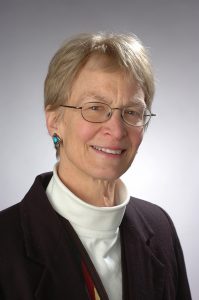 The 2017-2018 academic year has closed with four students earning Master of Science (M.S.) degrees and three students with Certificates of Advanced Studies (C.A.S.) in Food Studies. They include: Briana Alfaro, Hillary Chartron- Bartholomew, Mallory (Molly) Ennist, and Irma Nurliawati with the M.S. degree and Nodira Azizova, Tom Mackey, and Kris Walton with the C.A.S. In December 2016, Shelby Squire rocketed through with our first Food Studies M.S. even as we were moving the program into full swing. This year is really our first regular graduating class and we are very excited to see them launch forward. As you will see from the descriptions inside, each has excelled at research and program engagements, presenting their work at national and regional conferences and workshops. We look forward to next year with a powerful group of returning M.S. students – Maegan, Katie, Cheyenne, and Adrianne – as well as a greatly anticipated crop of new students. The program is growing; our collaborations with partners on campus and beyond expanding; and we are ready to develop our particular program niche and strengths in food justice and policy, political economy, and human rights.
The 2017-2018 academic year has closed with four students earning Master of Science (M.S.) degrees and three students with Certificates of Advanced Studies (C.A.S.) in Food Studies. They include: Briana Alfaro, Hillary Chartron- Bartholomew, Mallory (Molly) Ennist, and Irma Nurliawati with the M.S. degree and Nodira Azizova, Tom Mackey, and Kris Walton with the C.A.S. In December 2016, Shelby Squire rocketed through with our first Food Studies M.S. even as we were moving the program into full swing. This year is really our first regular graduating class and we are very excited to see them launch forward. As you will see from the descriptions inside, each has excelled at research and program engagements, presenting their work at national and regional conferences and workshops. We look forward to next year with a powerful group of returning M.S. students – Maegan, Katie, Cheyenne, and Adrianne – as well as a greatly anticipated crop of new students. The program is growing; our collaborations with partners on campus and beyond expanding; and we are ready to develop our particular program niche and strengths in food justice and policy, political economy, and human rights.
Congratulations M.S. Food Studies Graduates 2017-18
Briana Alfaro
Practicum site: San Diego Food System Alliance, San Diego, CA
“I collected narratives on accessing public land for the Urban Agriculture Working Group, created an assessment tool to determine whether a restaurant is “healthy” from a food systems perspective, helped to plan a Farm Bill Forum for local stakeholders, and undertook grant research.”
Hillary Katrina Chartron-Bartholomew
Practicum site: Cornell Cooperative Extension of Onondaga County, Syracuse, NY
“This Practicum facilitated a 2018 Central New York Food Summit with the theme Improving Our Local Food System. Focusing on all sections of our food system, this event connected farmers, processors, distributors, community partners, educators, and policymakers to help advance our local food system in Central NewYork.”
Molly Ennist
Practicum site: Capital Roots, Albany, NY
“I spent my Practicum working with Capital Roots on the Greater Capital Region Food System Assessment, an ongoing assessment of the regional food system encompassing 11 counties. Specifically, I analyzed the food recovery system in the region, developing a systems map and identifying key players. This work included analyzing survey information, interviewing, and general research.”
Irma Nurliawati
Practicum site: Agricultural Affairs Division, The Embassy of the Republic of Indonesia, Washington, DC
“My main job as an intern under the agriculture attaché was to assist with her works, such as preparing and attending
meetings; writing technical papers; and preparing information or data related to trade, agriculture (including food and fisheries), forestry and environment. I was assigned to assist the attaché in organizing the 2017 ASEAN Agricultural Attaché Roundtable and preparing a technical paper, “The Potential of Cacao Products From Indonesia and its Market Opportunities in the United States” for The Ministry of Agriculture.”
Irma’s thesis title was: “Indonesia’s Food Safety Regulations on the Import of Fresh Agri-Foods: Balancing Public Health Protection and Trade Facilitation.” Policy makers have the responsibility to balance the economic benefits (e.g., right to work and the right to adequate standard of living) and public health protection (right to safe and adequate food) to ensure an inclusive regulation. The study analyzed Indonesia’s existing national food safety standards for imported fresh foods using a food sovereignty framework and human rights perspective. It identified the most suitable food safety control mechanism at the border, particularly for fresh imported products in Indonesia.
Research from Continuing Students
Maegan Krajewski
Lunch Money: School Food Programming in Regina, Saskatchewan
The study will use qualitative interviewing techniques to understand the work that local organizations, volunteers, and school administrators do to provide school food programming in the city of Regina. With no national school food program in Canada, Regina will serve as a case study for how a particular municipality operates to provide food to schoolchildren.
Katherine Mott
Shortcomings of Healthy Food Financing Initiatives in Grocery Stores: The Case of Syracuse, New York
This paper aims to analyze Near Westside residents’ food access strategies in the wake of the loss of their cornerstone grocery store. This research contributes to broader discussions on the complexities of food access issues within marginalized communities. Precisely, this paper examines why grocery stores within low-income neighborhoods of color might rely heavily on financing initiatives for produce and why these initiatives are often times unsuccessful.
Cheyenne Schoen
Opportunities and Challenges of Refugee Farmers in an Organized Farming Project in Syracuse, New York
This paper qualitatively analyzes the Refugee and Immigrant Self-Empowerment (RISE) farming project, which engages New Americans in an organized gardening and farming program in Syracuse. Cheyenne will interview active farmers in the RISE project to understand their cultural perceptions, barriers and goals to farming, and compare those to the goals of organizational staff and farm land owners.
Adrianne Traub
Female Fermenters of New York
In 1913 considerably more than half the cannery workers in New York State were women (Factory Investigating Commission, 1913). Who were these female fermenters and how did their role shape the cultural food ways of the region? How did their roles in their families, communities, and workplaces change? Through interviews, archival research, and scholarly literature their story is revealed as one of reliance and multifaceted identity.
Conferences & Presentations
AFHVS/ASFS 2017 – Migrating Food Cultures: Engaging Pacific Perspectives on Food and Agriculture
Briana Alfaro, “Local Beer, Local Governance: Policy Issues for San Diego Breweries”
Molly Ennist, “Locating the Intersection of Violence Against Women and Violations of The Human Right to Adequate Food and Nutrition”
Irma Nurliawati, “Food Safety Regulations on the Import of Fresh Agrifoods: A Human Right Perspective on Fair Trade and Right to Safe Food in Indonesia”
Adrianne Traub, “Fueling the Rural Economy: Funding Food Infrastructure”
Northeast Sustainable Agriculture Working Group (NESAWG) 2017: “It Takes a Region” Conference
Graduate Student Posters:
Adrianne Traub
Katherine Mott
Molly Ennist
AFHVS/ASFS 2018 – The Agroecological Prospect: The Politics of Integrating Food and Farming with Values and the Land
Maegan Krajewski, “Together We Can Grow Community: Community Gardening in North Central Regina”
Katherine Mott, “Shortcomings of Healthy Food Financing Initiatives in Grocery Stores: The Case of Syracuse, New York”
Cheyenne Schoen, “Food Insecurity & Feeding Work Among Immigrant Women Domestic Workers”
Adrianne Traub: “Female Fermenters of New York”
Falk College Research Poster Celebration 2018
Maegan Krajewski, “Rights or Wrong: Concerns with Canada’s Implementation of the Right to Food”
Katherine Mott, “An Analysis of the Closing of Nojaim Brothers Supermarket in the Near Westside Neighborhood of Syracuse, NY: Initial Findings”
Cheyenne Schoen, “Right to Food in U.S. News”
Adrianne Traub, “Procuring Local and Regional Foods from Beginning Farmers: A Qualitative Study of Intermediaries”
Award Recipients
Outstanding Teaching Assistant Award – Briana Alfaro
“Briana always exceeds expectations as a Teaching Assistant by providing critical assistance to the students both in and out of the classroom. She has proven to be highly motivated, exceptionally competent, and genuinely passionate about her position as a Teaching Assistant. Her outstanding dedication to student learning makes her a strong asset to our University community and Food Studies Department.”
~ Adrianne Traub, Adjunct Instructor and graduate student
2018 Excellence in Graduate Education Faculty Recognition Award – Dr. Evan Weissman
“Dr. Weissman is an innovative scholar who sees opportunities for engagement in the classroom as tied to social justice, practical application, and community engagement. His graduate level courses meet students where they’re at in their academic journey, and then push them to become engaged scholars who are concerned with the lasting impact that a well-informed citizen can make in their community, at any level. His students have benefitted from this grounded approach and go on to complete cogent research and critical professional advancements.”
~ Elissa Johnson, Internship Practicum Coordinator, Food Studies
Roseane do Socorro Gonçalves Viana Human Rights Award – Cheyenne Schoen
Best graduate paper on human right to food, nutrition, and/or health.
Scrapbook 2017-2018
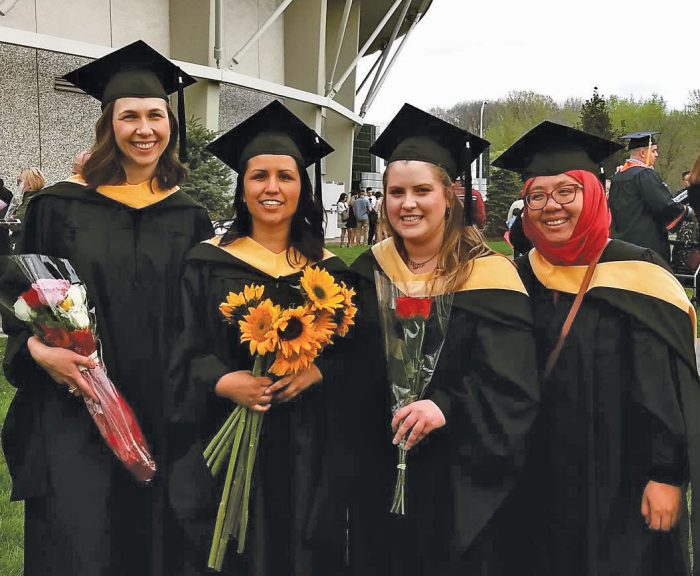
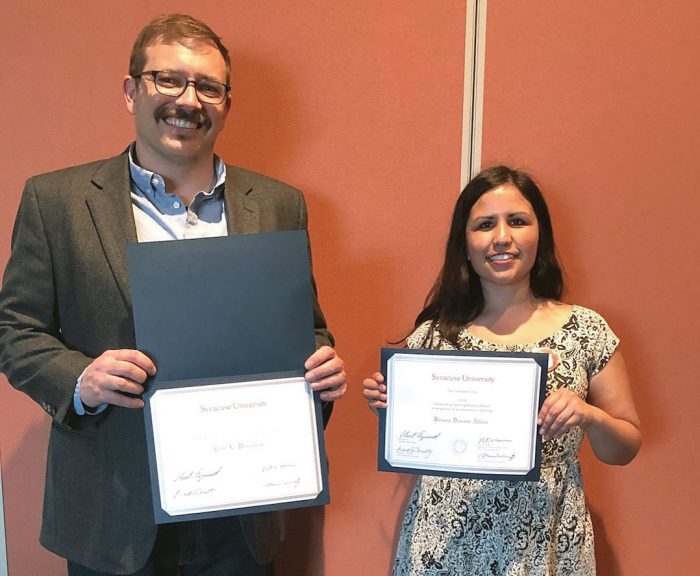
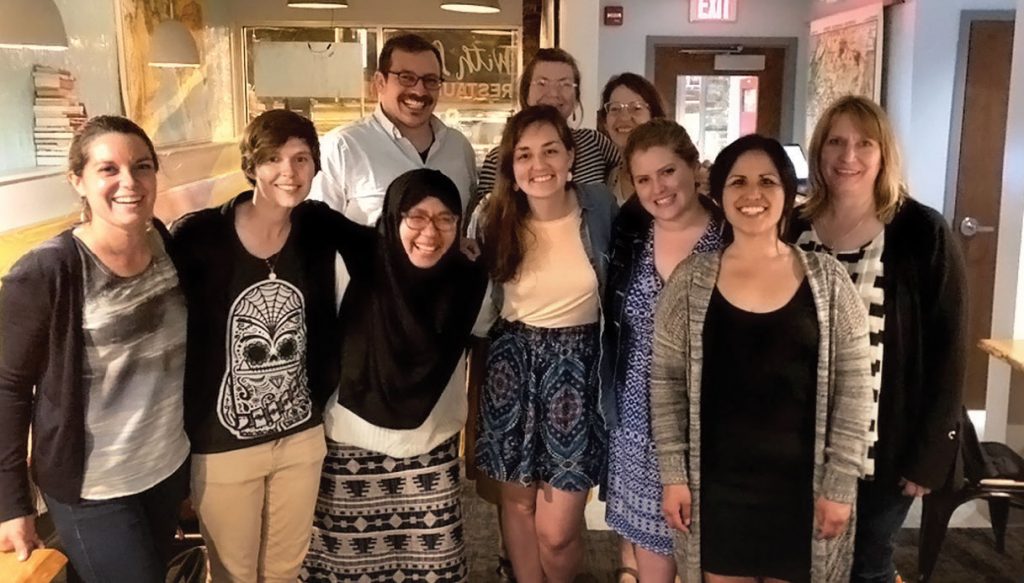
Back row: Dr. Evan Weissman, Elissa Johnson, Adrianne Traub. Front row: Dr. Laura-Anne Minkoff-Zern, Maegan Krajewski, Irma Nurliawati, Katherine Mott, Molly Ennist, Briana Alfaro, Jennifer Hurley.
Learn more about Food Studies
Browse our academic programs
Learn about our excellent faculty
Meet our students
Read about research our students are engaged in
Contact us
Professors Jung, Weissman honored for excellence in graduate teaching
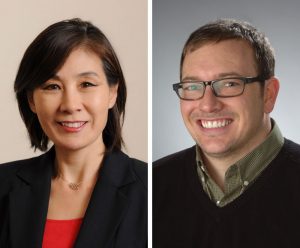 In recognition of dedication to graduate students and commitment to excellence in graduate teaching and mentoring, Falk College faculty members Eunjoo Jung, associate professor of human development and family science, and Evan Weissman, assistant professor, food studies, received 2018 Excellence in Graduate Education Faculty Recognition Awards. The honors were presented by the Graduate School at Syracuse University at a ceremony on April 26.
In recognition of dedication to graduate students and commitment to excellence in graduate teaching and mentoring, Falk College faculty members Eunjoo Jung, associate professor of human development and family science, and Evan Weissman, assistant professor, food studies, received 2018 Excellence in Graduate Education Faculty Recognition Awards. The honors were presented by the Graduate School at Syracuse University at a ceremony on April 26.
“We are grateful for their commitment to graduate students and proud of the excellence in mentorship and teaching Eunjoo and Evan bring to their academic programs as well as Falk College,” says Diane Lyden Murphy, Falk College Dean.
ACE Center’s innovative design receives honor from AIA
Ashley McGraw Architects honored by American Institute of Architects for innovative design of Falk College’s Nutrition ACE Center, Klenk Café and Teaching Kitchens
The American Institute of Architects Central New York Chapter (AIA CNY) honored Falk College, its Department of Public Health, Food Studies, and Nutrition, and its architects, Ashley McGraw Architects, D.P.C. The group’s work in Falk Complex was cited for innovative ideas, attention to detail, and dedication to the design profession as contributing to the architectural success of the Central New York region and beyond. The award was presented at the AIA Central New York’s annual Celebration of Architecture at the Hotel Syracuse. AIA CNY recognizes outstanding works of architecture through its annual design awards program. The purpose of the program is to celebrate achievements in design excellence by architects in the Central New York region and to honor the architects, clients and consultants who work together to create and enhance the environment that was built.
“We are very proud of our partners and colleagues from Ashley McGraw for this award. We could not be more pleased with the design and the excellent learning opportunities their innovative design continues to provide our students in our food, nutrition and public health programs,” says Falk College Dean, Diane Lyden Murphy.
The Susan R. Klenk Learning Café and Kitchens opened in September 2016 and provides a hands-on learning laboratory to prepare students with traditional and emerging professional competencies for careers in food, nutrition, dietetics, and public health. The facility includes an experimental food lab kitchen, commercial kitchen, baking nook and café. A video camera system allows faculty and chef instructors to broadcast classes, food demonstrations and seminars from Falk College to anywhere on campus and across the country. A generous and visionary gift from Falk College alumna, Susan R. Klenk, made the learning café and kitchens possible.
The experimental food lab includes an 8 station-teaching kitchen and an associated café. Lunch is served in the café during the last four weeks of each semester, allowing hands-on experience for the students at every stage of food planning, preparation and service.
“Not only was it a rewarding experience working with the College to design these important spaces, but it has been gratifying to witness students taking ownership of them,” says Christina Aßmann, project architect, Ashley McGraw Architects, D.P.C.
The ACE Center’s demonstration kitchen features an island-cooking suite at the front of a 50-seat lecture hall. Cameras capture the activity of cooking from every angle, images are projected on 3 large TV screens above the counter, giving the audience multiple perspectives of the activity at hand and providing the possibility of recording or broadcasting.
The learning café and teaching kitchens set the stage for industry-leading, forward-thinking approaches to food and culture, nutrition, research, and food studies development. The design fosters creativity and collaboration across a variety of departments, schools and colleges, creating interdisciplinary partnerships that support teaching innovation, student learning, research and scholarship. In addition to unlimited faculty-supervised hands-on experiences, this dedicated space provides an ideal environment for student-faculty research projects and educational community partnerships that set the SU programs apart.
Syracuse Symposium to Present Multicultural Celebration Dec. 2
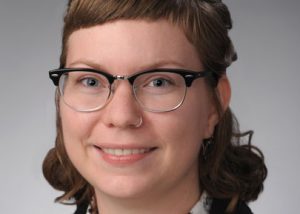
By Rob Enslin
Syracuse Symposium continues its yearlong theme of “Belonging” with a celebration of multicultural food, music and dance.
On Saturday, Dec. 2, Syracuse students, along with locally resettled refugees and immigrants, will present “Music and Food in Multicultural Syracuse: Performing New American Traditions” from 6-8:30 p.m. in Falk College.
Free and open to the public, the event is a collaboration among the Department of Art and Music Histories in the College of Arts and Sciences (A&S); the Food Studies Program in Falk College; and With Love, a teaching restaurant and business incubator on Syracuse’s North Side, operated by Onondaga Community College.
Co-organizer Sydney Hutchinson says the program will highlight an eclectic mix of music and dance traditions, followed by a cuisine reception.
“Our students have spent the entire semester interviewing refugee musicians, artists and chefs, documenting their unique traditions,” says Hutchinson, associate professor of music history and cultures in A&S. “Special emphasis has been on Burma, [a sovereign state in Southeast Asia], which also is the culinary theme of With Love.”
The evening will begin with a program of music and dance from 6-7:30 p.m. in Grant Auditorium. Performers include Burundian dancer Beatrice Muradi, Karen and Matupi Chin dancers of Burma, Congolese musicians Immaculee Kandathe and Olivier Byinshi, Syrian oudist Ahmad Alkhlef and dabke dancers from the Saint Elias Orthodox Christian Church in Syracuse.
A reception will follow in Wildhack Lounge, featuring hors d’oeuvres from Burma and a slideshow of images documenting student work from throughout the semester.
Hutchinson says the decision to focus on Burma was “easy,” since the country accounts for more than a quarter of all resettled refugees in Central New York. “Burma is home to many different ethnic groups who speak a multitude of languages, and engage in markedly different music, dance and religious traditions,” she explains.
According to the New York State Office of Temporary and Disability Assistance, Onondaga County has received more than 9,500 refugees since 2007, the greatest number of whom are from Burma.
Slightly smaller than Texas, Burma borders India and Bangladesh to the west, Thailand and Laos to the east and China to the north.
One of the highlights of the semester has been a cooking lab with Nancy Aye, a Burmese chef at With Love, who has helped students prepare food for the reception.
Hutchinson and co-organizer Elissa Johnson credit Adam Sudmann, With Love’s program manager, for facilitating such experiences. “The beneficiaries are not only students, but also refugees, immigrants and low-income citizens,” Hutchinson says.
“Our students have been able to explore Burma’s cultural foodways, as well as its political and social histories,” says Johnson, who teaches “Food, Identity and Power” (FST 204) in Falk. “For many, it has been an eye-opening experience, absorbing Burmese traditions and learning about some of the issues that refugees and immigrants face in Central New York.”
In addition to Burma, students have spent the semester learning about the food and cultures of other countries, including Syria, the Democratic Republic of the Congo, Burundi, Bhutan, Afghanistan, Pakistan, Ethiopia and Puerto Rico.
“This project is an excellent opportunity to draw connections between performances—in the traditional sense, through dance and music—and through the performance of cultural foodways,” says Johnson, also a Falk internship placement coordinator. “We don’t always acknowledge food and cooking as a cultural art form that it is, and this collaboration certainly highlights all three.”
In October, Hutchinson’s students presented refugee music traditions and documented traditional food cultures at the 2017 Convening of the Welcoming Economies Global Network in Syracuse. “It was a special opportunity to collaborate with an organization dedicated to promoting the contributions of immigrant-entrepreneurs in Rust Belt cities,” she says.
Organized and presented by the Humanities Center, Syracuse Symposium is a public humanities series that revolves around an annual theme. Programs include lectures, workshops, performances, exhibits, films and readings. Located in the Tolley Humanities Building, the Humanities Center serves the campus community by cultivating diverse forms of scholarship, sponsoring a broad range of programming and partnerships and addressing enduring questions and pressing social issues.
Falk College welcomes prospective students at New York City
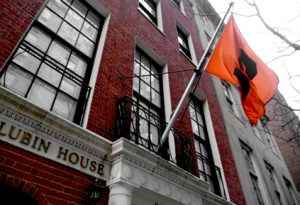 On Sunday, October 1, Falk College will welcome prospective students and family members in the greater New York City metropolitan area to an informational program at 12:00 noon at Syracuse University’s Lubin House, 11 E. 61st Street. A parking garage is available adjacent to the Lubin House building. In addition to the opportunity to meet one-on-one with Falk Admissions Office staff, the program will provide an overview of the college’s academic programs for undergraduates in Food Studies, Human Development and Family Science, Nutrition Dietetics, Nutrition Science, Pre-Health, Public Health, Social Work, Sport Analytics, and Sport Management.
On Sunday, October 1, Falk College will welcome prospective students and family members in the greater New York City metropolitan area to an informational program at 12:00 noon at Syracuse University’s Lubin House, 11 E. 61st Street. A parking garage is available adjacent to the Lubin House building. In addition to the opportunity to meet one-on-one with Falk Admissions Office staff, the program will provide an overview of the college’s academic programs for undergraduates in Food Studies, Human Development and Family Science, Nutrition Dietetics, Nutrition Science, Pre-Health, Public Health, Social Work, Sport Analytics, and Sport Management.
Undergraduate Fall Orange Preview Days are scheduled for Monday, October 9 and Friday, November 10. Online registration for all programs is accessible at on Syracuse University’s website.
Falk College welcomes new faculty and staff
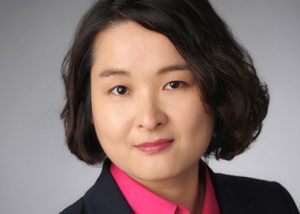
Falk College is pleased to announce the appointment of one new faculty member, Dayeon Shin, as well as three visiting faculty members, Kate Clancy, Indu Gupta, and Sreekumar Nellickappilly, all joining the the Department of Public Health, Food Studies and Nutrition. Falk also welcomes new staff members who have joined various departments of Falk College in the past academic year, including the Department of Human Development and Family Science, the School of Social Work, and the Office of the Dean.
Mary Kiernan Inducted into American Academy of Chefs
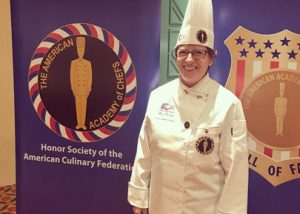
In July, Associate Teaching Professor Mary Kiernan was inducted into the American Academy of Chefs (AAC), the honor society of the American Culinary Foundation (ACF). The ACF was established in 1929. Today, the professional chefs’ organization boasts 17,500 members and more than 150 chapters throughout the U.S. See the full list of 2017 AAC inductees online.
“It is the highest honor for me to be recognized by my colleagues in the culinary world,” says Chef Kiernan. “We all work hard to elevate the profession of the chef. To be able to stand side-by-side with this esteemed group of chefs, who continuously promote scholarship so that others may choose this path, is by far my greatest achievement.”
Prior to her current role as Associate Teaching Professor in the Falk College Department of Public Health, Food Studies, and Nutrition, Chef Kiernan held other roles within Syracuse University. She first came to SU in 2000 to work in Carrier Dome Catering where she managed 42 private suites and numerous other functions related to games and floor dinners. She became an instructor in Hospitality Management in 2007 and received her IMBA at Syracuse University’s Whitman School of Management in 2012. She also holds a bachelor of science in hospitality management from Florida International University in Miami.
Food studies alumnus says there’s more to food than what’s on your plate
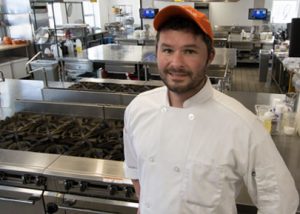
A hectic newsroom isn’t exactly where one would expect to come across food studies students, but that’s just where you’ll find them at the LongHouse Food Scholars Program in Upstate New York. The two-week residential program describes itself as a “food media boot camp” that provides hands-on training in writing and multimedia, as well as mentoring and networking opportunities for aspiring food journalists, activists, academics and entrepreneurs. Food studies alumnus Collin Townsend ‘17 says the LongHouse Food Scholars Program gave him a broad range of learning experiences, as well as valuable connections he still corresponds with.
Townsend graduated from the Culinary Institute of America in 2011 and worked in New York City as a professional chef before moving to Syracuse in 2014 to open his own restaurant. Still, Townsend felt something was missing. He decided to pursue higher education, and was drawn to the food studies program at Syracuse University.
Syracuse University’s Falk College takes a unique approach to food studies. With a specific focus on food as a system, the program incorporates topics such as food production, governance, sustainability, and security. “Food is such a complex issue, with dynamic ties to one’s culture, family, and status within society,” says Townsend. “Every aspect of human society, one way or another, is impacted by food. If you find yourself wondering why there are gender disparities, you can look at food. If you question why there are different classes within society, food can shine a light on the subject. If you have ever just looked down at your plate and thought, ‘Who the heck grew this?’ food studies can help explain it.”
Through his coursework, Townsend says he has been exposed to a number of fascinating topics. For him, the most interesting has been food sovereignty. “Empowering people and communities to have total control over their food in every shape and form from seed to plate is a truly remarkable theory that I have found to be a righteous cause to advocate for.”
One of today’s most pressing global issues, Townsend believes, is the consolidation of food production. “Consolidation within the agriculture, processing, production, and marketing sectors has put enormous power into a very small number of corporations’ hands,” he explains. “While this has made food more readily available than ever before in human history, it has also created a scary dynamic in which most humans are completely removed from what they put in their body.”
Townsend says that the mentorship of his professors in food studies has inspired him to continue his education and become a professor. “A large number of people view food more as an inconvenient necessity, rather than something that makes us uniquely human,” says Townsend. As a professor, Townsend hopes to share his passion for food with his future students.
Congratulations Class of 2017!
Dean Diane Lyden Murphy, along with the faculty and staff of Falk College, congratulates the Class of 2017! We are excited to see where your careers take you. Remember that you are “forever orange” and will always be a part of Falk College and Syracuse University.
We invite you to stay in touch and connect through social media, on Instagram, Facebook, Twitter, and LinkedIn.
As alumni, you will now receive FalkTalk, Falk College’s email newsletter for alumni, parents and friends. FalkTalk keeps you up-to-date with news headlines, student highlights, and upcoming events delivered to your inbox at the end of each semester.
Learn how to stay connected to the ‘Cuse Community in regions all around the world
Answer these quick questions on how to reach you after graduation
We have many photos to share that recap some of the celebration events of this past week:
- Falk College Convocation & Reception
- BSSW Awards Celebration
- MSW Graduates Headed to Europe
- Human Development and Family Science Celebration
- Public Health Food Studies and Nutrition Awards Presentation
- Public Health Posters
- Marriage and Family Therapy Graduation Luncheon
- Sport Management Senior Reception
- Convocation photos from Sport Management
Check out more photos of commencement weekend on Collage or at #SUGrad17.
Baked Magazine’s “Veg Out” highlights BrainFeeders student organization
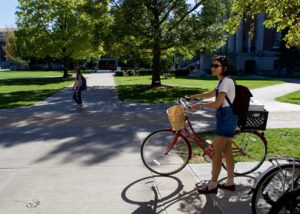
Veg Out: By connecting students with local farmers, BrainFeeders makes it easy to get your daily serving of greens
By Megan Falk ’19. Courtesy of Baked Magazine
As the sun rises over the boundless field, drops of dew shimmer atop rows of lettuce, tomatoes, and radishes. A farmer swiftly harvests the vegetables one by one and gently places them in boxes with red and green type. Within an hour, the packages are en route to 13 different locations throughout Central New York, including Syracuse University. As they arrive, a young woman rides across the SU campus on her vintage blue bicycle and picks up her small box of vegetables from the farm, as she does every week. She piles the generous amounts of potatoes, kale, fennel, leeks, and delicata squash into her wire basket and pedals off with enough vegetables to last her the next seven days. Throughout the next two hours, 37 additional Syracuse University students and faculty will arrive to gather their share of produce.
Each Thursday, Common Thread Farm, located in Madison, New York, delivers local, organic produce to the University for members of a CSA (community supported agriculture) program. According to the United States Department of Agriculture, members of a CSA program pledge to contribute to the anticipated costs of running a farm and the farmer’s salary for the growing season, which provides a sense of financial security for the farmer. In return, members receive shares of the farm’s produce, but they run the risk of receiving poor harvest due to detrimental weather or pests.
The CSA program at Syracuse University is the product of the SU organization BrainFeeders.
In the spring of 2015, then-seniors Lindsay DeMay and Imelda Rodriguez created BrainFeeders after they realized the only way for students and faculty to buy fresh produce on campus was by taking the bus to the Central New York Regional Market. The duo then decided to partner with Common Thread and begin their own CSA pickup location at SU, which they launched in the fall of 2015. The program now boasts 40 members.
“When you hand people veggies, they go nuts,” says President Will Cecio. “They love it. This club is actually starting to make an impact on campus, trying to get people to cook more, eat healthy, eat more local and seasonal vegetables.” Throughout the nine-week program, members receive a box full of various seasonal vegetables. They choose between small boxes, which contain four to five types of vegetables and cost $150 for the nine weeks, and large boxes, holding eight to 10 kinds of vegetables for a price of $280. Felice Ramallo, secretary of BrainFeeders, says that although the prices seem steep, members may get five of each type of vegetable, which ends up being a bargain. “If you were to go to the grocery store and get this many veggies, it would be like, 50 bucks for a small box because these are organic,” she says. “In fact, this is probably less than if you were getting non-organic as well.”
Though Common Thread is not USDA certified as organic, it is recognized as organic by the Northeast Organic Farming Association of New York. Cecio explains that becoming USDA certified is often an extra expense to the farmers. Individuals who visit the farm can see they practice organic and sustainable techniques, such as using compost fertilizers or natural pesticides, he says. Besides providing fresh, naturally-grown vegetables to students, the boxes introduce the program’s members to new food and allow them to expand their cooking savvy. Participants may learn to cook healthy and tasty alternatives to classic dishes, or get creative with their ingredients—pumpkin pancakes, anyone?
“We want to increase people’s awareness in general of what they’re putting into their bodies,” says Ramallo. “Not just their health, but where it’s coming from, and who it’s impacting other than themselves.”
Page 14 of 21
